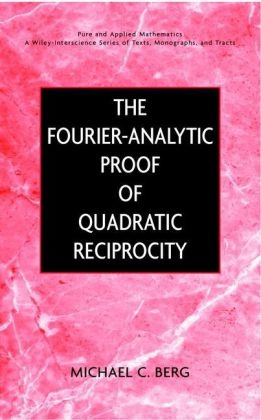Mehr lesen
Zusatztext "Provides number theorists interested in analytic methods applied to reciprocity laws...explore the work of Hecke! Weil! and Kubota and their Fourier-analytic treatments..." (SciTech Book News! Vol. 24! No. 4! December 2000) Informationen zum Autor MICHAEL C. BERG, PhD, is Professor of Mathematics at Loyola Marymount University, Los Angeles, California. Klappentext Der relativ einfache quadratische Fall wurde zuerst 1923 von Hecke gelöst, dann 1964 von Weil in die Darstellung mit unitären Gruppen übertragen. Der analytische Beweis des allgemeinen Falls n-ter Ordnung steht bis heute noch aus. Beiträge etlicher Zahlentheoretiker zum Problem der Reziprozitätsgesetze faßt der Autor dieses Buch zusammen, diskutiert sie verallgemeinernd und zeigt Ansätze zur Lösung des Hecke-Problems auf. (08/00) Zusammenfassung This unique book explains in a straightforward fashion how quadratic reciprocity relates to some of the most powerful tools of modern number theory such as adeles, metaplectic groups, and representation, demonstrating how this abstract language actually makes sense. Inhaltsverzeichnis Hecke's Proof of Quadratic Reciprocity. Two Equivalent Forms of Quadratic Reciprocity. The Stone-Von Neumann Theorem. Weil's "Acta" Paper. Kubota and Cohomology. The Algebraic Agreement Between the Formalisms of Weil and Kubota. Hecke's Challenge: General Reciprocity and Fourier Analysis on the March. Bibliography. Index.
Inhaltsverzeichnis
Hecke's Proof of Quadratic Reciprocity.
Two Equivalent Forms of Quadratic Reciprocity.
The Stone-Von Neumann Theorem.
Weil's "Acta" Paper.
Kubota and Cohomology.
The Algebraic Agreement Between the Formalisms of Weil and Kubota.
Hecke's Challenge: General Reciprocity and Fourier Analysis on the March.
Bibliography.
Index.
Bericht
"Provides number theorists interested in analytic methods applied to reciprocity laws with an opportunity to explore the work of Hecke, Weil, and Kubota and their Fourier-analytic treatments..." (SciTech Book News, Vol. 24, No. 4, December 2000)
"The content of the book is very important to number theory and is well-prepared...this book will be found to be very interesting and useful by number theorists in various areas." (Mathematical Reviews, 2002a)

